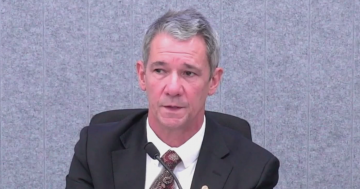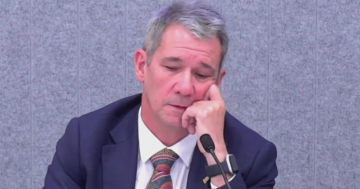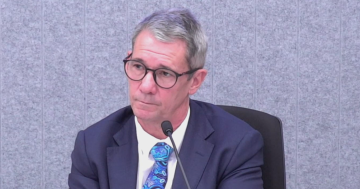
Director of Public Prosecutions Shane Drumgold has been keeping judges accountable. Photo: Claire Fenwicke.
The ACT courts have long had a reputation, unwarranted or otherwise, of being soft on crime.
At one point, it seemed nigh on impossible to get a murder conviction in this town, although cleared convicted cop killer David Eastman would beg to differ.
Now some of the sentences being handed down for some of the Territory’s most heinous crimes are being openly questioned, as are the judges delivering them.
If it were just the police or their union raising a clamour, the issue might fade from view, but when the Director of Public Prosecutions makes a point of it in the ACT Bar Association Bulletin, it is time to sit up and take notice.
Police everywhere argue that they get the rough rub of the green regarding convictions and sentences. Arresting villains is their business, so that is understandable.
Prosecutors also have a vested interest in putting people away to show they are doing their jobs properly.
But DPP Shane Drumgold, who has lifted the profile and performance of prosecutions since he took the role in 2019, is not one for self-promotion or banging the law and order drum for the sake of it.
Justice has been at the heart of his approach to trial outcomes from the start of his term, setting up an appeals team to look at sentencing trends and see how they sit with community standards and expectations.
The DPP has been active in the ACT Court of Criminal Appeal in 2021-22 and has won nearly 70 per cent of its appeals.
Mr Drumgold says the number of Crown appeals is significantly higher than in previous periods, and most sought to address sentences for murder and child sexual offending that the DPP considered fell clearly short of community standards.
He has not criticised his court colleagues but has not pulled any punches either (respectfully, of course).
“It is important that Crown appeals remain rare and exceptional … It is, however, equally important that this office ensures that the jurisdiction’s sentencing practices reflect legitimate community standards and expectations, and our structure ensures we discharge this important duty,” he wrote in the Bulletin.
Attorney-General Shane Rattenbury has fended off calls for a review of sentencing and bail outcomes, arguing that the successful appeals show the system is working and that there is accountability.
In a sense, he is right. That is why there is an avenue for appeals. And Mr Rattenbury will never be one to play to the mob in such a highly emotive area or pit the executive against the judiciary.
But he can express, as Mr Drumgold has, a view about sentences and community standards.
The good news is that in rejecting a review, he also said that did not mean there were not “particular areas of work that we can do”.
Stiff jail terms may not always be the answer but the cases cited are at the extreme end of offending and provoke revulsion and understandable community anger when a sentence does not go anywhere near fitting the severity of the offence and the impacts on victims and their families.
Favourable bail decisions where the risk of flight or reoffending is high also rankle, especially when recidivists with records of hundreds of charges are involved.
It is hoped the ACT’s magistrates and judges are listening and getting the message. This is not about destroying any capacity for redemption or rehabilitation – although in some cases, that window closed long ago – but appropriate justice and protecting the community.
What is not wanted is mandatory sentencing and the loss of discretion that is so important in the administration of justice.
Mr Drumgold should be commended for exercising all of his judicial options. May he continue to do so.




















